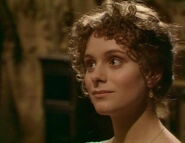- "I could easily forgive his pride, if he had not mortified mine."
- —Lizzy about Mr. Darcy's pride.
Elizabeth Bennet is the female protagonist of Jane Austen's Pride and Prejudice. She is the daughter of Mr. and Mrs. Bennet and has four sisters; Jane, Catherine, Lydia, and Mary. The family lives in Hertfordshire at the estate of Longbourn, near the village of Meryton. Elizabeth is particularly close with her sister Jane and Charlotte Lucas, a 'plain' woman who lives in the neighborhood. While she does love her mother, she is inclined to disagree with her at times, especially on the subject of marriage.
Biography
Elizabeth is the second of five sisters and her father's favourite, and is described by him by having "something more of quickness than her sisters"; though she is often distressed and embarrassed by the behaviour of her mother and of her younger sisters. Her father is a gentleman and a landowner, but his estate, Longbourn, is entailed away from him because he does not have a son, and upon his death, Longbourn will be inherited by his cousin William Collins, a sycophantic and foolish clergyman. Elizabeth is described as being the child that her mother is "least fond" of, especially after she refuses Mr. Collins' proposal of marriage, probably because her mother cannot understand her. She is considered a local beauty and charming, with "fine eyes", which are the first features Fitzwilliam Darcy is drawn to. He is later drawn more particularly to her mind and her personality, and eventually considers her to be "one of the handsomest women" in his acquaintance. In her case it is truly shown that inner beauty graces the outer.
The novel primarily focuses on Elizabeth and her relationship with Fitzwilliam Darcy, a wealthy, proud man who upon their first meeting snubs her at a public dance in her home village. Elizabeth's first impression then is to disdain Mr. Darcy. When she meets handsome, attentive George Wickham, she considers him charming and personable and there is a mutual attraction between them. Wickham leads Elizabeth and the neighborhood to believe he has been unfairly treated by Darcy, claiming that Darcy denied him a living as a clergyman that was his due. However, no one draws suspicion to the fact that he had been silent while Darcy was around, and only sJared his sotry one the Bingleys and Darcy had gone to London. Elizabeth's dislike of Darcy is further fueled by his disrupting the courtship of her beloved sister Jane and Charles Bingley, Darcy's friend. Elizabeth is persuaded that her prejudice against Darcy is well-founded, both on available evidence and upon her superior judgment of human character. Meanwhile, Jane is suffering because Mr. Bingley, the man whom she thought loved her, has gone away to London. Jane was persuaded that the cause of this departure was because Bingley's sisters, Caroline Bingley and Louisa Hurst, thought an attachment between their brother and Jane would not be proper because of the disparity in wealth and social position. Later Elizabeth learns from Darcy's cousin, Colonel Fitzwilliam, that it was Darcy who collaborated with Caroline and Louisa to separate the pair, all which causes her to dislike Mr. Darcy even more. In fact, her dislike of him at this point may go even beyond dislike and into a minor hatred.
As a result, when Darcy, who has fallen in love with her, proposes marriage—only a few hours after her conversation with his cousin, and during which he constantly reminds her of the large gap in their social statuses, Elizabeth passionately refuses him. When asked why, she sharply details her reasons for disliking him, not the least being his role in separating Jane and Mr. Bingley; and, she notes the account of him received from Mr. Wickham. Finally, on his complaint of her apparent bitterness, she replies: the arrogant way by which he proposed to her prevented her from feeling concerns for him she "might have felt... had you behaved in a more gentlemanlike manner."
Darcy departs in anger and mortification; he writes a letter to Elizabeth wherein he hotly and bitterly defends his wounded honour and reveals the motives for his interference in Jane and Bingley's relationship; and he gives a full account of his lifelong dealings with Wickham. After much thought, Elizabeth recollects inconsistencies in Wickham's story, and now she suspects he is not such the honourable character as she first judged. She begins to recognize her own prejudices and her errors in judgment. Elizabeth also begins re-evaluating her opinions of Darcy who, it seems, is also committed to some significant re-evaluation of his own actions and general behaviour towards others.
Later in the story Elizabeth is invited by her aunt and uncle to go Derbyshire with them. While they are there, they persuade Elizabeth to visit Darcy's estate of Pemberley, but only because Elizabeth is certain that they will not encounter him. When they arrive, Elizabeth finds the mansion and gardens beautiful and impressive. Elizabeth also feels at one point that "to be mistress of Pemberley would be something".
When Darcy returns home unexpectedly a day before he is due, and meets her on the grounds of Pemberley, she is astonished at his courtesy to her and her relatives. Later, she is introduced to Georgiana Darcy, Fitzwilliam Darcy's sister. Elizabeth is charmed by Georgiana's shy disposition, and they soon become good friends.
When Elizabeth's youngest sister, Lydia, elopes with Wickham, Darcy intervenes, and at significant expense, saves Lydia from disgrace. Although she was not intended to know about his involvement, Elizabeth finds out through her aunt that it was Darcy who found the couple and informed Mr. Garrived of their whereabouts.
Elizabeth realizes that her feelings for Darcy are now quite the opposite as before. She does not hate him anymore; quite to the contrary, she loves him with even more passion than she used to hate him. Soon after Elizabeth's sister Jane gets engaged to Mr. Bingley, Darcy proposes a second time and Elizabeth finally accepts, leaving them both extremely happy.
Personality and traits
Elizabeth is an intelligent young woman who is described as having "a lively, playful disposition, which delighted in any thing ridiculous". She often presents a playful good natured impertinence that does not offend but rather endears. Early in the novel she is depicted as being personally proud of her mental quickness and her accuracy in judging the social behaviour and intentions of others.
Bennet Family
- Father: Mr. Bennet
- Mother: Mrs. Bennet
- Sisters:
Titles
- Miss Elizabeth Bennet - Before her marriage and being younger than Jane Bennet, she held this title until her marriage.
- Mrs Darcy - Elizabeth's title after her marriage to Fitzwilliam Darcy.
- My Mistress - Elizabeth's title during her marriage to Darcy, in Pemberley, being the Mistress of Pemberly.
- Cousin Elizabeth - When Mr. William Collins calls for Elizabeth.
- Eliza/Lizzy - By close family and friends.





